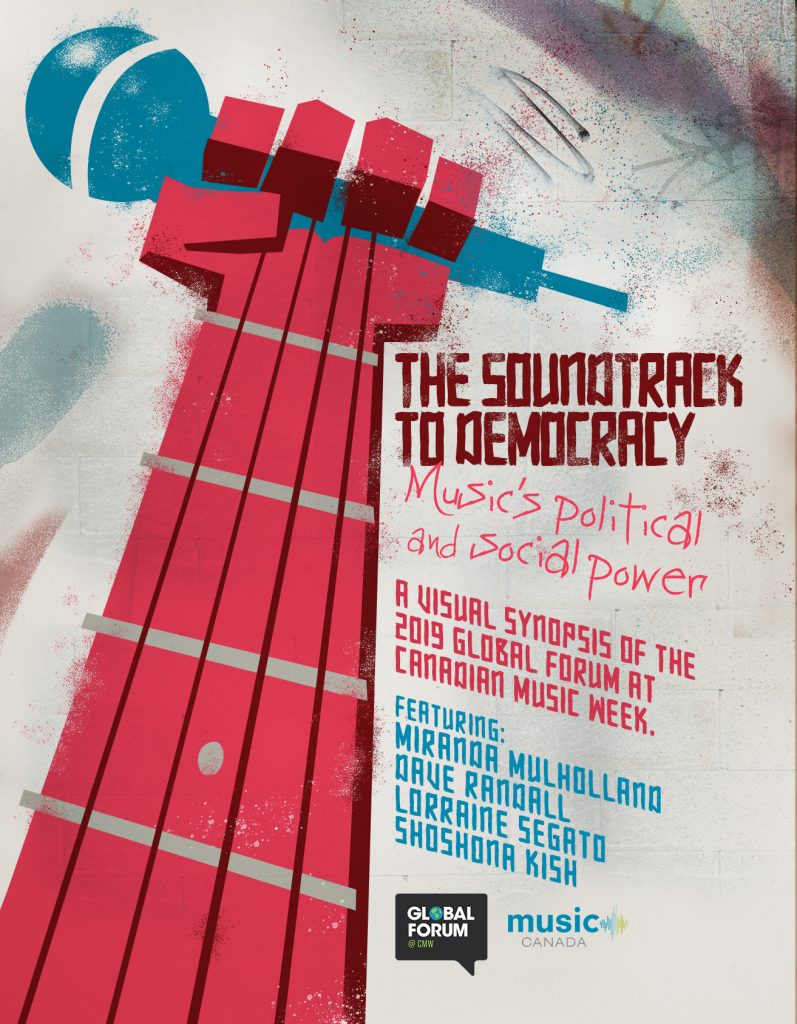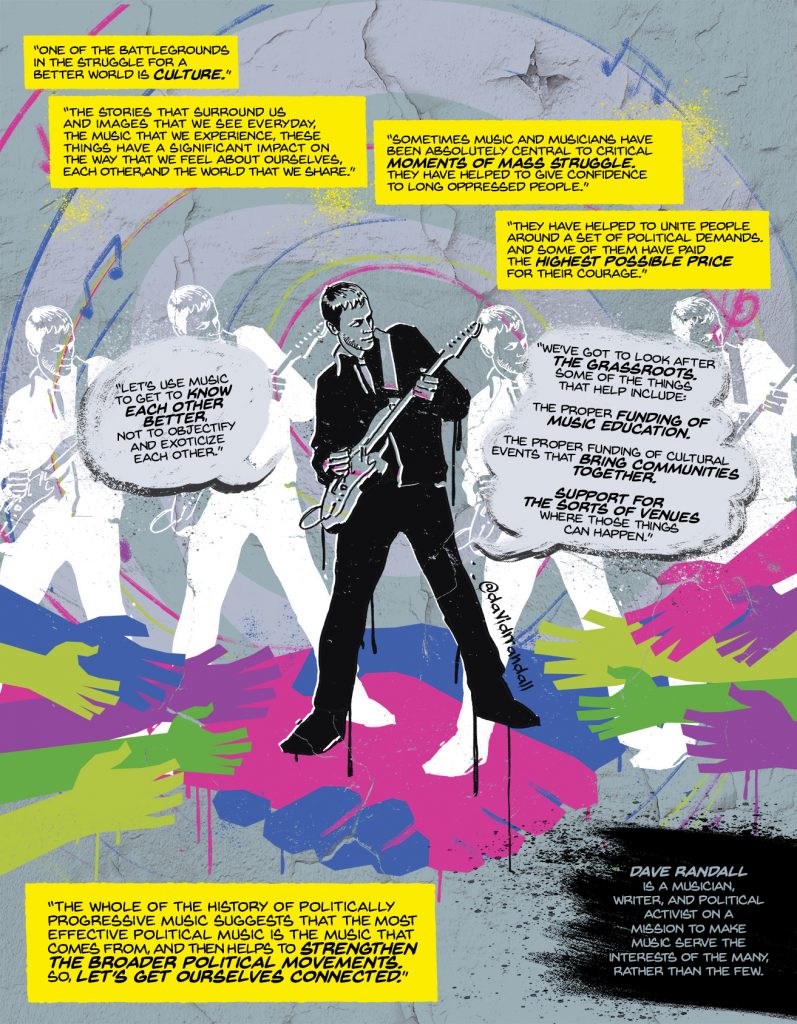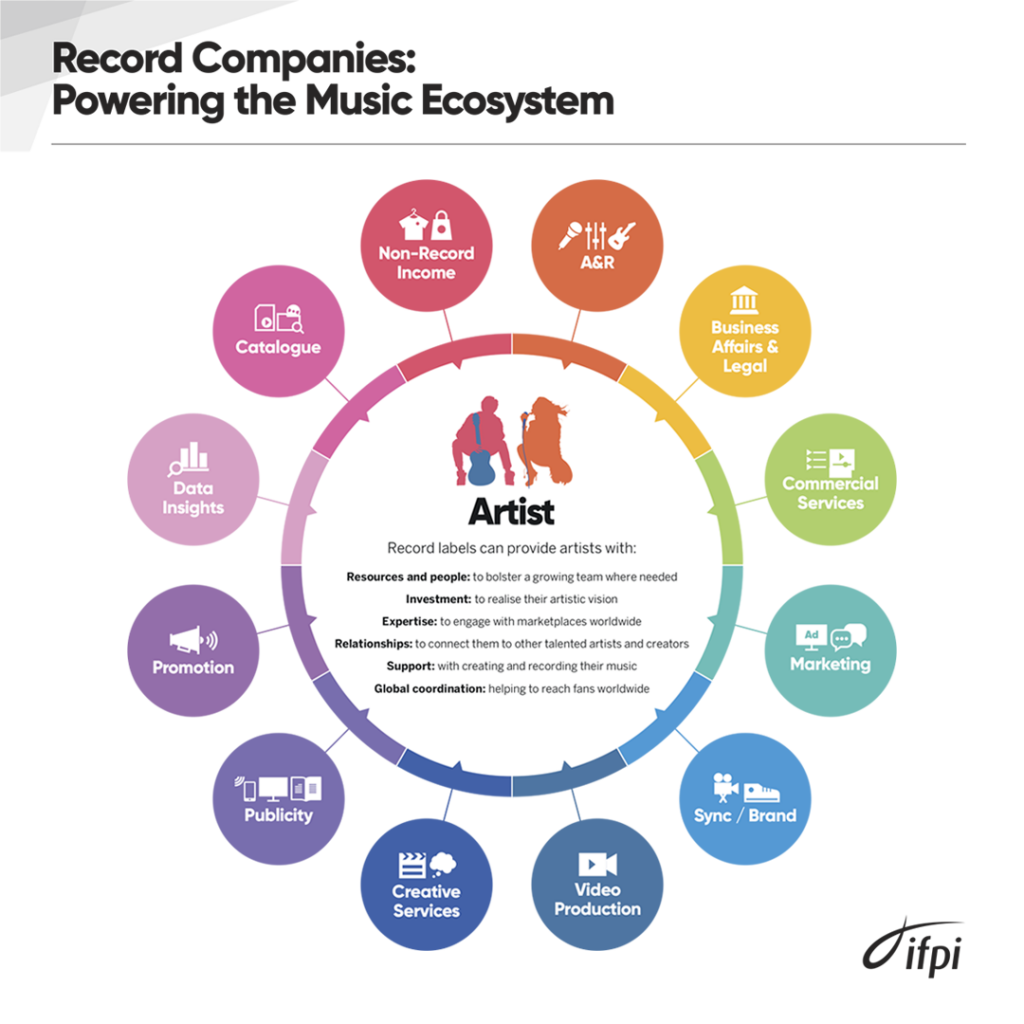Coalition of Canadian music organizations sign Canadian Creative Industries Code of Conduct, announce training & education resources will be available through Unison Benevolent Fund
 March 16, 2019, London, ON: A coalition of Canadian music community groups has joined in solidarity and is working towards environments free of harassment, discrimination, violence, and bullying for the music community.
March 16, 2019, London, ON: A coalition of Canadian music community groups has joined in solidarity and is working towards environments free of harassment, discrimination, violence, and bullying for the music community.
Today the coalition announced that 42 music groups have formally signed on to the Canadian Creative Industries Code of Conduct. By signing on to the Code, the organizations are acknowledging their responsibility to build safe, respectful workplaces, and are committing to improving and implementing policies to keep the music community safe.
As a first step, members of the coalition have formed an Education, Training and Safe Support Committee, which is working to provide each member of the Canadian music community with the appropriate resources and training to identify, confront and prevent harassment, bullying and violence in any workplace. Unison Benevolent Fund has volunteered to host a suite of educational and training resources through its website at no cost. These resources will be made available to the music community at a later date.
Today’s announcement was made at Allies in Action, an event focused on initiatives undertaken or underway to create safer spaces as the Canadian music community gathers in London, Ontario for the 2019 JUNO Awards.
Because of the uniqueness of the music business and the spaces in which musicians and music workers often operate, the coalition has added the following music-specific preamble to the existing Canadian Creative Industries Code of Conduct:
“We, the Canadian music community signatories, support the Canadian Creative Industries Code of Conduct. We recognize that in the music industry, the terms work, workplace and work-related, are extremely broad and can include any physical or virtual spaces at any time.”
You can read the full Canadian Creative Industries Code of Conduct at www.ReadTheCode.ca
Additional organizations that would like to sign on to the Code can register online. Once the form has been completed, new signatories should email a high resolution company logo to info@readthecode.ca with your organization’s name and “Becoming Code signatory” in the subject line.
Music industry groups that have signed on to the Canadian Creative Industries Code of Conduct are:
– 30 –
Supporting quotes
“The Canadian Creative Industries Code of Conduct addresses the distinct circumstances of music professionals, and the unique ways in which we work. Unison exists as a resource for the Canadian music community during times of crisis, and we look forward to investing in more proactive solutions that prioritize the safety of music workers. On behalf of the Unison Board of Directors, we would like to extend our most sincere thanks to the Education, Training, and Safe Support Committee for putting such a vital program together. We’re proud to partner with them to further serve the Canadian music community.”
– Amanda Power, Executive Director, Unison Benevolent Fund
“As organizations, CARAS and Music Canada deeply value respect, inclusiveness and excellence. Both organizations believe everyone working in this beautiful and complex music community deserves to feel safe and supported. To achieve this, we’re working on national initiatives like the Allies in Action event, as well as local CARAS partnerships in our host cities with groups like Anova in London and Good Night Out in Vancouver to make JUNO Awards events safe for everyone.
Signing the Code is a way for Canadian music community groups to affirm our dedication to our shared values, and to reinforce those values with action. Through the work of the Education, Training and Safe Support Committee, I’m very pleased that we will be able to offer all members of the Canadian music community the resources to help make all of our workplaces safer.”
– Jackie Dean, Chief Operating Officer, CARAS, The JUNO Awards, MusiCounts
Chief Financial Officer, Music Canada
“Canadian Federation of Musicians (CFM), as the union for professional musicians, is committed to representing and protecting its membership in all facets of their career. Signing the Canadian Creative Industries Code of Conduct represents the music community’s shared action towards creating a healthy culture with zero tolerance to all forms of harassment. Working to ensure health and safety in the workplace for our membership is one of the union’s many functions. We will continue to pledge our resources, support and expertise and proudly sign on behalf of our over 17,000 active Canadian members.”
– Liana White, Executive Director, Canadian Federation of Musicians
“The Code is a community statement and commitment that each signatory organization and company takes their own measures to discourage and address harassment in their workplaces. It acknowledges that music industry workplaces are often non-standard workplaces, known as extended workplaces, and include studios, venues, bars, green rooms, and tour buses, among others. If we collectively are motivated to meet the commitments in the Code, it will help musicians and all workers across the industry feel safer and more enabled to collaborate, create great music, and ensure that there is a professional platform to share the work of the world’s best artists.”
– Michael Adam Murray, Executive Director, Toronto Musicians’ Association (TMA), local 149
“Canada’s live music industry is doing its part to ensure that every live music space is a safe place through our recently launched Raising the Bar program. Raising the Bar addresses safer spaces, harm reduction and event safety at live music events – be they indoors or out, and will work to complement both the ethos and practical implications of the Canadian Creative Industries Code of Conduct. We are all in this together, and we are vigorously working to supplant systemic issues with positive change.”
– Erin Benjamin, Canadian Live Music Association President & CEO
“The Canadian Creative Industries Code of Conduct is a wonderful initiative that provides a uniform set of standards to ensure the safety and success of of our colleagues throughout the industry.”
– Samantha Slattery, Founder, Women in Music Canada
“It is important that we have all signed on to the Code as a community but now it is even more important that we look at ways to proactively change the way we do business.”
– Margaret McGuffin, Executive Director, Canadian Music Publishers Association
For more information:
Victoria Lord, VLPR Inc.
416-484-9047
victoria@vlpr.com
/////
42 organismes canadiens de musique s’unissent pour promouvoir la sécurité et le respect en milieu de travail
Une coalition d’organismes canadiens de musique signe le Code de conduite des industries créatrices du Canada et annonce que des ressources de formation et d’éducation seront disponibles par l’entremise du Fonds de bienfaisance Unison
 London (Ontario), le 16 mars 2019: Une coalition d’organismes de l’industrie canadienne de la musique se donnent la main pour favoriser la création de milieux de travail exempts de harcèlement, de discrimination, de violence ou d’intimidation au service de la communauté musicale.
London (Ontario), le 16 mars 2019: Une coalition d’organismes de l’industrie canadienne de la musique se donnent la main pour favoriser la création de milieux de travail exempts de harcèlement, de discrimination, de violence ou d’intimidation au service de la communauté musicale.
La coalition a annoncé aujourd’hui que 42 organismes musicaux ont formellement signé le Code de conduite des industries créatrices du Canada. Ce faisant, les organismes signataires reconnaissent la responsabilité qui leur revient de créer des milieux de travail sécuritaires et respectueux, et ce, en s’engageant à améliorer et à mettre en œuvre des politiques conçues pour assurer la sécurité au sein de la communauté musicale.
Comme premier pas, les membres de la coalition ont formé de Comité d’éducation, de formation et de soutien, conçu pour offrir à tous et chacun des membres de la communauté musicale canadienne les ressources et la formation requises pour identifier, confronter et prévenir le harcèlement, l’intimidation et la violence, quel que soit le milieu de travail. Le Fonds de bienfaisance Unison s’est porté volontaire pour mettre gratuitement à disposition sur son site Web une série de ressources d’éducation et de formation. Ces ressources seront plus tard rendues disponibles à la communauté musicale.
L’annonce d’aujourd’hui a été faite dans le cadre d’Allies in Action, un événement centré sur les initiatives en cours ou à venir visant à créer des espaces plus sécuritaires au moment où la communauté musicale canadienne converge vers London, en Ontario, pour le gala des Prix JUNO 2019.
Compte tenu du caractère unique de l’industrie de la musique et de la nature des espaces dans lesquels les musiciens et les travailleurs de l’industrie de la musique doivent souvent évoluer, la coalition a ajouté le préambule qui suit au Code de conduite des industries créatrices du Canada afin de le rattacher spécifiquement à la musique :
« Nous, signataires issus de la communauté musicale canadienne, soutenons le Code de conduite des industries créatrices du Canada. Nous reconnaissons que, dans l’industrie de la musique, les termes de travail, de milieu de travail et d’activité professionnelle sont extrêmement vagues et peuvent renvoyer à n’importe quel espace physique ou virtuel à n’importe quel moment. »
On peut lire le texte intégral du Code de conduite des industries créatrices du Canada au www.LireLeCode.ca
Les organisations qui souhaitent signer le Code peuvent s’inscrire en ligne. Après avoir rempli le formulaire d’inscription, les nouveaux signataires devraient envoyer un logo à haute résolution de leur entreprise à l’adresse info@lirelecode.ca avec le nom de leur organisation et la mention «Devenir signataire du Code» dans la ligne Objet.
Les associations de l’industrie de la musique qui ont signé le Code de conduite des industries créatrices du Canada sont les suivantes :
– 30 –
Citations à l’appui
« Le Code de conduite des industries créatrices du Canada tient compte des circonstances particulières des intervenants de l’industrie de la musique ainsi que de la singularité de nos façons de travailler. Unison existe pour venir en aide aux membres de la communauté de la musique au Canada pendant les périodes de crise, et nous sommes impatients d’investir dans des solutions plus proactives qui privilégient la sécurité des travailleurs de l’industrie de la musique. Au nom du conseil d’administration d’Unison, nous tenons à présenter nos plus sincères remerciements au Comité d’éducation, de formation et de soutien pour avoir créé un programme aussi essentiel que celui-là. Nous sommes fiers de nous associer à eux pour mieux servir la communauté musicale du Canada. »
– Amanda Power, directrice générale, Fonds de bienfaisance Unison
« Comme organisations, CARAS et Music Canada attachent une grande valeur au respect, à l’inclusion et à l’excellence. Ces deux organisations croient que quiconque travaille dans cette belle et complexe communauté musicale a le droit de se sentir en sécurité et entouré. Afin d’y arriver, nous travaillons sur des initiatives d’envergure nationale comme l’événement Allies in Action ainsi que sur des partenariats locaux de CARAS dans nos villes hôtes avec des groupes comme Anova à London et Good Night Out à Vancouver afin de rendre les événements des Prix JUNO sécuritaires pour tous.
Pour les intervenants de la communauté musicale du Canada, l’adhésion au Code est une façon d’affirmer leur engagement pour nos valeurs partagées et de renforcer ces valeurs par l’action. Grâce à l’œuvre du Comité d’éducation, de formation et de soutien, je suis heureuse de pouvoir affirmer que nous pourrons offrir à tous les membres de la communauté musicale canadienne les ressources qui permettront de rendre plus sécuritaire l’ensemble de nos milieux de travail. »
– Jackie Dean, chef des opérations, CARAS, les Prix JUNO, MusiCompte;
directrice financière, Music Canada
« À titre de syndicat de musiciens professionnels, la Fédération canadienne des musiciens (FCM) s’engage à représenter et à protéger ses membres dans tous les domaines de leur carrière. La signature du Code de conduite des industries créatrices du Canada représente une démarche collective de la communauté musicale pour la création d’une culture saine caractérisée par une tolérance zéro face au harcèlement sous toutes ses formes. Nos efforts pour assurer la santé et la sécurité du milieu de travail pour nos membres s’inscrivent dans les nombreuses fonctions du syndicat. Nous continuerons d’engager nos ressources, notre soutien et nos compétences et à adhérer fièrement au Code au nom de nos membres canadiens actifs, qui sont au nombre de plus de 17 000. »
– Liana White, directrice générale, Fédération canadienne des musiciens
« Le Code est un énoncé et un engagement communautaire visant à ce que chaque organisation et entreprise signataire prenne ses propres mesures pour décourager et faire face au harcèlement dans son milieu de travail. Il reconnaît que les milieux de travail de l’industrie de la musique sont souvent des espaces atypiques qu’on désigne sous le nom de milieux de travail élargis et qui peuvent être des studios, des lieux de spectacle, des bars, des salons verts et des autobus de tournée. Si nous nous engageons collectivement à respecter les engagements du Code, cela aidera les musiciens et l’ensemble des travailleurs de l’industrie de la musique à se sentir plus en sécurité et mieux encouragés à collaborer, à faire de la belle musique et à assurer l’existence d’une plateforme professionnelle permettant de partager les œuvres des meilleurs artistes du monde. »
– Michael Adam Murray, directeur général, Toronto Musicians’ Association (TMA), local 149
« L’industrie canadienne de la musique sur scène fait sa part pour assurer que chaque espace consacré à la musique en direct soit un milieu sécuritaire grâce au programme Raising the Bar que nous venons de lancer. Ce programme porte sur l’amélioration de la sécurité des espaces, la réduction des risques et la sécurité des événements musicaux en direct – qu’ils soient présentés en salle ou en plein air – et il servira de complément à la philosophie et aux implications pratiques du Code de conduite des industries créatrices du Canada. Nous sommes tous concernés, et nous nous affairons tous vigoureusement à remplacer les problèmes systémiques par des changements positifs. »
– Erin Benjamin, présidente et chef de la direction, Association canadienne de musique sur scène
« Le Code de conduite des industries créatrices du Canada est une excellente initiative qui nous présente un ensemble de normes uniformes permettant d’assurer la sécurité et le succès de nos collègues à la grandeur de l’industrie. »
– Samantha Slattery, fondatrice, Women in Music Canada
« Il est important pour chacun de nous d’avoir signé le Code en tant que communauté, mais il est maintenant encore plus important pour nous d’apprendre à modifier de façon proactive notre manière de faire des affaires. »
– Margaret McGuffin, directrice générale, Association canadienne des éditeurs de musique
Pour de plus amples renseignements :
Victoria Lord, VLPR Inc.
416-484-9047
victoria@vlpr.com






 Henderson’s message was clear – the creative middle class is being eliminated by outdated copyright laws. His speech can be viewed on the
Henderson’s message was clear – the creative middle class is being eliminated by outdated copyright laws. His speech can be viewed on the 












Music Canada